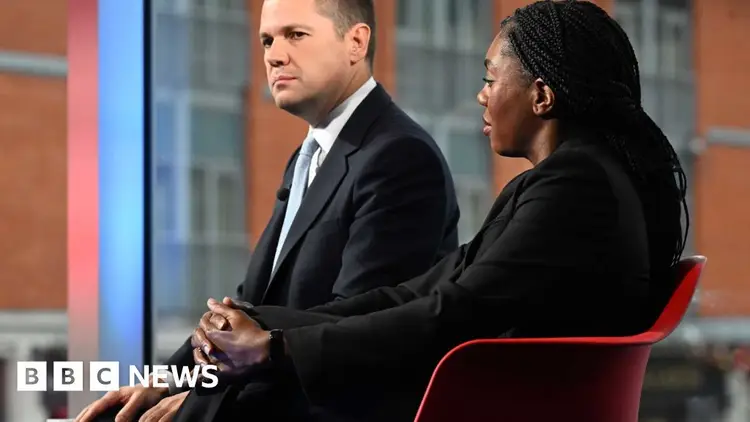Kemi Badenoch and Robert Jenrick at odds on tackling immigration

Kemi Badenoch, a candidate for Conservative leadership, stated that immigrants who come to the UK carrying "foreign conflicts" should not be accepted.
In an interview on BBC's Sunday with Laura Kuenssberg, she expressed her belief in "Western values," which she feels are fundamental to the greatness of the country. She emphasized the importance of upholding these principles to maintain the society we currently enjoy.
As the Conservative Party kicks off its conference in Birmingham, leadership contender Robert Jenrick stated in the same program that addressing immigration is his top priority.
He mentioned that the UK should exit the European Convention on Human Rights to solve the issue, but Badenoch does not support this idea.
There are two more contenders left in the race for the Conservative leadership: James Cleverly, who serves as the shadow home secretary, and Tom Tugendhat, the shadow security minister.
All four will take advantage of the conference, concluding on October 2, to share their arguments with Conservative party supporters.
Once Parliament reconvenes, Conservative MPs will reduce the number of candidates to two through votes on October 9 and 10. After that, party members will have the opportunity to cast their votes for their preferred candidate.
The announcement for the person who will win and take over from Rishi Sunak will be made on November 2nd.
Badenoch referenced an article in the Sunday Telegraph to emphasize that the nation anticipates immigrants to embrace the values of the UK.
"We shouldn't be naive and think that immigrants will simply leave behind their historical cultural conflicts when they arrive here, nor should we assume that all cultures hold the same value. That's not the case," she stated.
The leading candidates in the leadership race have opposing views on the most effective ways to cut down on immigration. This topic is particularly significant for many Conservative Party members, who think it played a key role in driving away millions of voters to Reform UK during the general election in July.
During his conversation with Laura Kuenssberg, Jenrick disagreed with Badenoch's focus on cultural issues.
Emphasizing his dedication to limiting net migration to the tens of thousands, he stated, "The figures are important too."
Simply stating, "I’ll come up with a plan in a few years" is a sure way to create conflict and erode public confidence. I already have a plan ready to go.
Badenoch criticized him for inaccurately portraying her views, stating that while numbers are important, "the culture is even more significant. The identity of those entering the country is crucial."
When she was asked about which cultures might be considered "less valid," she emphasized that it wasn't about putting labels on cultures.
In cultures where women are discouraged from working, I've often found myself knocking on doors, only to be greeted by someone who says, "I can't talk to you, I'll have to get my husband." I don't believe that mindset holds the same value as our own culture.
Badenoch, originally from London, spent a significant portion of her early years in Nigeria before coming back to the UK. She expressed her desire for the country not to become reminiscent of the environment she had tried to escape.
The shadow communities secretary has urged for an improved approach to integrating immigrants that highlights British values, aiming to ensure a common culture and identity for everyone.
"Our responsibility is to ensure that those who enter the country are individuals who cherish it and are invested in its success."
Jenrick, who stepped down from his role as immigration minister in Sunak's cabinet, highlighted in his interview the importance of establishing a legally enforceable limit on immigration figures. He warned that without such a measure, politicians would keep disappointing the public.
When asked if he would consider leaving positions vacant to reduce the numbers, he responded, "I don't think that's likely to happen... but if you want to know if I would focus on this, then yes, I absolutely would."
"I won't pretend that putting an end to this period of large-scale migration will be easy, but I believe it doesn't have to be a financial burden on us."
When asked by Sky News about the Conservatives' significant loss in the general election this past July, Cleverly noted that voters were turned off by the ongoing internal conflicts and disputes within the party.
They were unhappy that as soon as someone took on the role of prime minister, there were individuals in the party who tried to push them out of that position.
"We didn't just do it a couple of times; we repeated it many times. The British public made it clear that they wanted us to focus on their needs rather than our own."
In an appearance on Sky News, Tugendhat highlighted his achievements in the military and various public service roles to showcase his integrity and character.
When asked if the Conservative Party needed another "privileged leader from an elite school," he responded: "I believe the party requires a leader who can truly guide it. You can evaluate me based on the choices my parents made three decades ago, or you can focus on the choices I’ve made over the past 35 years."
"I have made the ongoing decision to dedicate myself to our nation. I have actively positioned myself on the front lines in Iraq and Afghanistan."









































